By Leen Randell
Updated: Jul 04, 2024
10 Best Herbal Decoctions For Dry Throat
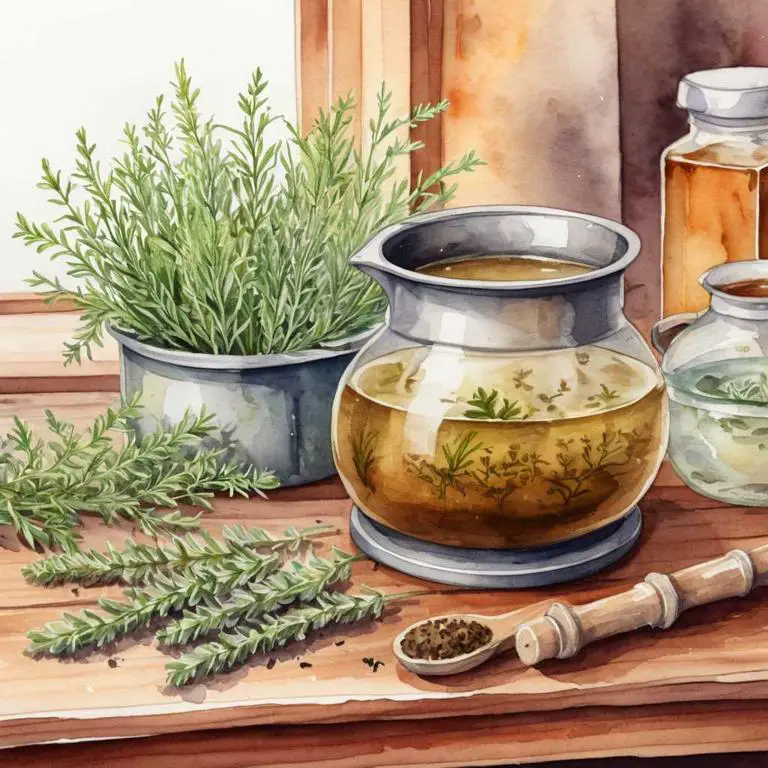
Herbal decoctions for dry throat are a natural remedy that combines herbs to soothe and calm a dry, irritated throat.
These concoctions work by providing anti-inflammatory and antibacterial properties that help reduce swelling and combat infection-causing bacteria. Examples of herbal decoctions that help with dry throat include a mix of slippery elm, marshmallow root, and licorice root, which can be consumed as a tea or taken as lozenges.
Drinking these decoctions can provide instant relief from scratchiness and hoarseness, allowing individuals to speak and sing without discomfort, improving their overall quality of life.
The following article describes in detail the most important decoctions for dry throat, including medicinal properties, parts of herbs to use, and recipes for preparations.
- 1. Glycyrrhiza glabra
- 2. Thymus vulgaris
- 3. Verbascum thapsus
- 4. Achillea millefolium
- 5. Althaea officinalis
- 6. Calendula officinalis
- 7. Camellia sinensis
- 8. Echinacea purpurea
- 9. Gaultheria procumbens
- 10. Hedera helix
- What is the best combination of herbal decoctions to use for dry throat?
- What ailments similar to dry throat are treated with herbal decoctions?
1. Glycyrrhiza glabra
Licorice decoctions helps with dry throat because of its unique properties.
The herb contains compounds that help to soothe and calm irritated mucous membranes, reducing inflammation and discomfort associated with a dry throat. Additionally, licorice root has natural anti-inflammatory and antibacterial properties that can aid in the healing process by combating infections and promoting tissue repair.
By consuming a warm licorice decoction, individuals can expect a rapid relief from dryness, itchiness, and scratchiness, leaving their throats feeling smooth and refreshed.

Medicinal Constituents
The list below shows the primary medicinal constituents in Glycyrrhiza glabra decoctions that help with dry throat.
- Saponins: Saponins help to soothe and protect the mucous membranes in the throat, reducing inflammation and irritation associated with dry throat.
- Glycyrrhizin: Glycyrrhizin has anti-inflammatory properties that help to reduce swelling and inflammation in the throat, providing relief from dryness and discomfort.
- Flavonoids: Flavonoids, such as quercetin and kaempferol, exhibit antioxidant and anti-inflammatory properties that help to calm and protect the mucous membranes in the throat, reducing dryness and inflammation.
Parts Used
The list below shows the primary parts of licorice used to make decoctions for dry throat.
- Roots: The roots of Glycyrrhiza glabra are the most used part due to their high glycyrrhizin content, which gives licorice its distinctive sweet flavor and has anti-inflammatory properties.
- Leaves: The leaves of Glycyrrhiza glabra are used to make decoctions for their soothing and anti-inflammatory effects, which help to calm a dry and irritated throat.
- Stems: The stems of Glycyrrhiza glabra are also used to make decoctions, which are valued for their ability to provide relief from dryness and irritation in the throat.
Quick Recipe
The following recipe gives a procedure to make a basic licorice for dry throat.
- Harvest 20-30 grams of dried glycyrrhiza glabra roots.
- Wash the roots in cold water to remove any impurities or debris.
- Crush the roots into small pieces using a mortar and pestle.
- Steep the crushed roots in 1 liter of boiling water for 10-15 minutes.
- Strain the decoction and discard the solids after 10-15 minutes of cooling.
2. Thymus vulgaris
Thyme decoctions helps with dry throat because its antimicrobial properties help to soothe and calm irritated tissues, reducing inflammation and discomfort.
The antibacterial compounds in thyme also work to eliminate any underlying infections that may be contributing to the dryness and irritation.
Additionally, thyme's expectorant properties help to loosen and clear mucus from the throat, providing relief from congestion and coughing.
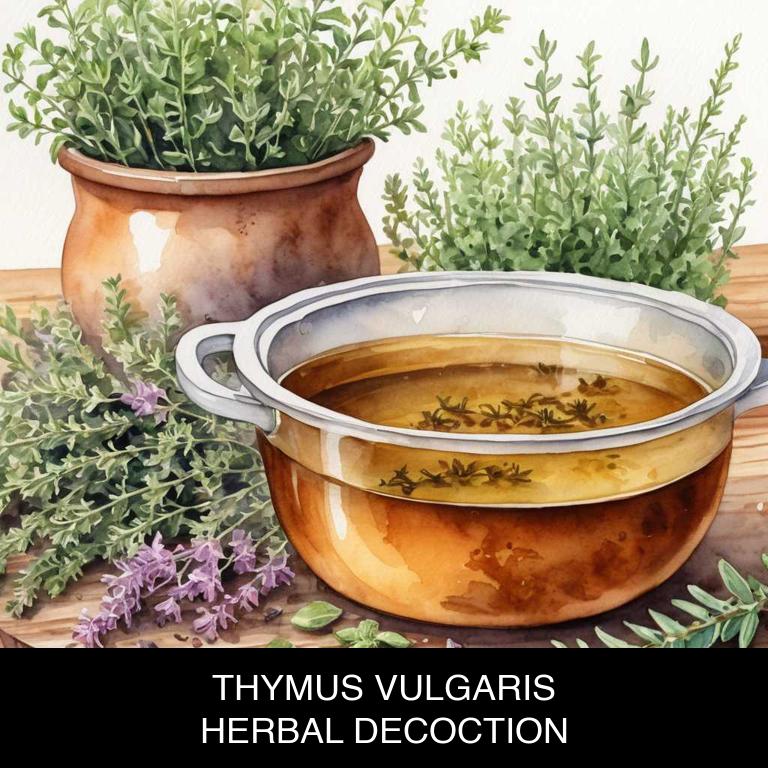
Medicinal Constituents
The list below shows the primary medicinal constituents in Thymus vulgaris decoctions that help with dry throat.
- Thymol: Thymol helps with dry throat by exhibiting antimicrobial properties, which can reduce inflammation and promote healing in the mucous membranes.
- Carvacrol: Carvacrol has anti-inflammatory and antiseptic properties, which can help soothe and calm an irritated throat, reducing the discomfort associated with dryness.
- Rosmarinic acid: Rosmarinic acid, a phenolic compound, has antioxidant and anti-inflammatory effects, which can help protect the mucous membranes from oxidative stress and reduce inflammation in the throat, providing relief from dryness.
Parts Used
The list below shows the primary parts of thyme used to make decoctions for dry throat.
- Leaves: They are rich in thymol, a compound that helps to soothe and calm the throat, providing relief from dryness and irritation.
- Stems: The stems contain essential oils that have antimicrobial properties, which aid in combating infections and promoting healing in the throat.
- Flowers: The flowers have a gentle, soothing effect on the throat, and their fragrance can help to ease coughs and provide temporary relief from dryness.
Quick Recipe
The following recipe gives a procedure to make a basic thyme for dry throat.
- Harvest thymus vulgaris leaves and flowers in the morning after the dew has evaporated for best quality.
- Clean and dry the harvested thymus vulgaris leaves and flowers in a cool place for 24 hours.
- Combine 2 grams of dried thymus vulgaris leaves and flowers with 250 milliliters of water in a saucepan.
- Heat the thymus vulgaris mixture over low heat for 10 to 15 minutes then reduce heat to simmer.
- Strain the decoction through a cheesecloth and discard the solids then let it cool to room temperature.
3. Verbascum thapsus
Mullein decoctions helps with dry throat because of its natural anti-inflammatory properties, which soothe and calm irritated mucous membranes.
The expectorant properties of mullein also help to loosen and clear out mucus and phlegm, relieving congestion and discomfort.
Additionally, the herb's demulcent properties create a protective barrier on the mucous membranes, reducing irritation and inflammation, and providing fast relief from dryness and soreness in the throat.
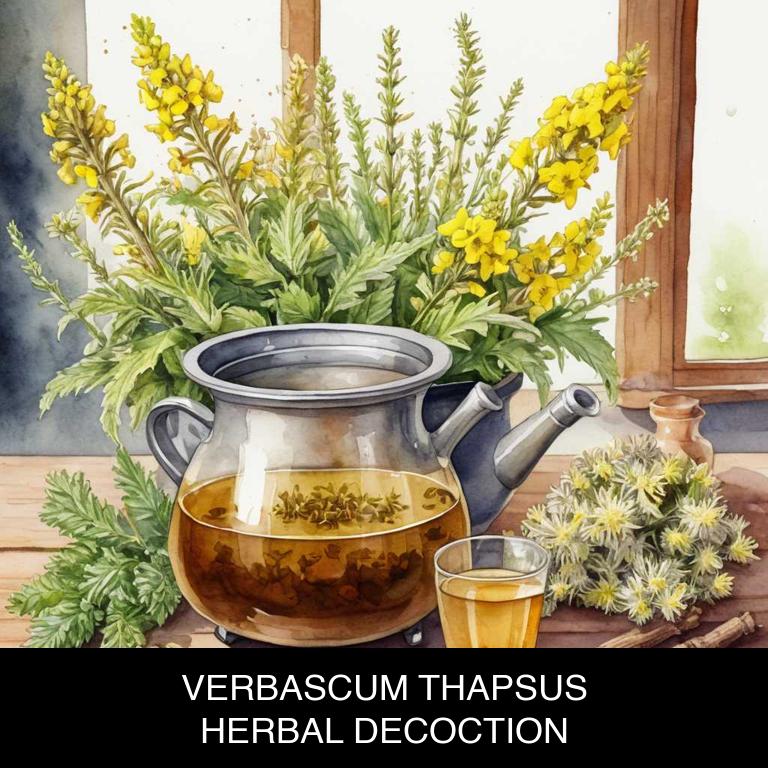
Medicinal Constituents
The list below shows the primary medicinal constituents in Verbascum thapsus decoctions that help with dry throat.
- Flavonoids: These compounds, specifically verbascoside, have anti-inflammatory and antioxidant properties that help soothe and protect the mucous membranes in the throat, thereby relieving dry throat symptoms.
- Triterpene saponins: Triterpene saponins, such as ursolic acid, have anti-inflammatory and expectorant properties that help to reduce inflammation, thin mucus, and promote its expulsion from the respiratory tract, providing relief from dry throat.
- Iridoids: Iridoids, such as verbascoside and aucubin, possess anti-inflammatory and antimicrobial properties that help to reduce swelling and combat infections in the throat, thereby alleviating dry throat discomfort.
Parts Used
The list below shows the primary parts of mullein used to make decoctions for dry throat.
- Leaves: Used due to their rich content of mucilages, which help soothe and moisturize the throat.
- Roots: Utilized for their anti-inflammatory and soothing properties, which aid in reducing throat irritation.
- Flowers: Employed for their expectorant properties, helping to clear mucus and promote a healthy respiratory system.
Quick Recipe
The following recipe gives a procedure to make a basic mullein for dry throat.
- Harvest 20-30 grams of fresh verbascum thapsus flowers or 10-15 grams of dried flowers.
- Chop the harvested flowers into small pieces and add them to a saucepan.
- Add 1 liter of water to the saucepan and bring the mixture to a boil.
- Reduce the heat and let the mixture simmer for 5-10 minutes.
- Strain the decoction through a cheesecloth or a fine-mesh sieve into a container.
4. Achillea millefolium
Yarrow decoctions helps with dry throat because of its potent anti-inflammatory properties, which soothe and calm irritated mucous membranes.
The decoction's flavonoids and terpenes work together to reduce swelling and ease congestion, providing quick relief from a scratchy or hoarse throat. Additionally, yarrow's expectorant properties help loosen and clear out mucus, further alleviating dryness and discomfort.
As a result, yarrow decoctions offer a natural and effective way to combat dry throat symptoms and promote overall respiratory health.
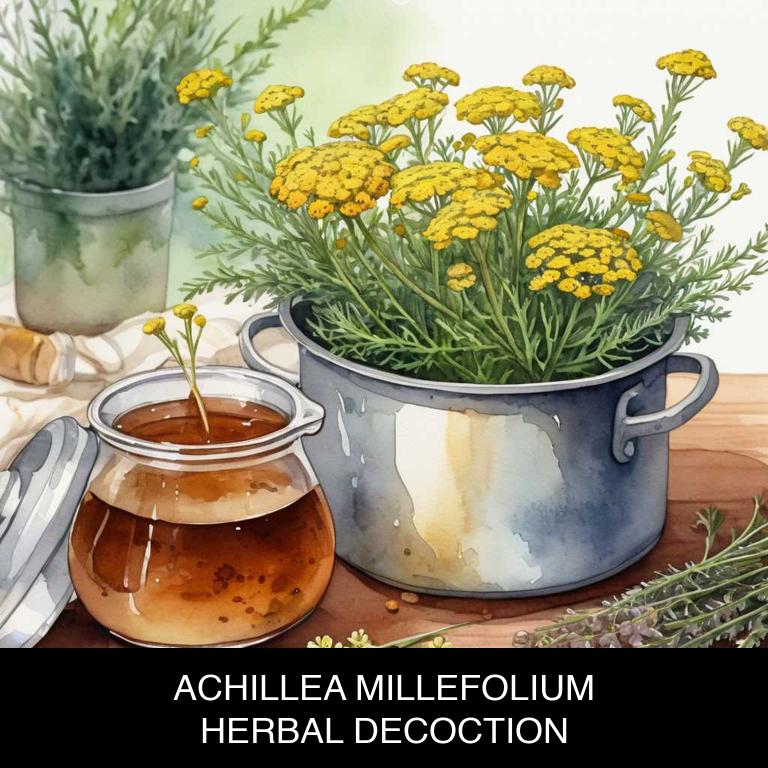
Medicinal Constituents
The list below shows the primary medicinal constituents in Achillea millefolium decoctions that help with dry throat.
- Caffeic acid: A phenolic compound that helps with dry throat by reducing inflammation and providing antioxidant properties that soothe the mucous membranes.
- Apigenin: A flavonoid that has anti-inflammatory properties, helping to reduce swelling and irritation in the throat, which in turn alleviates dryness.
- Bornyl acetate: A sesquiterpene that exhibits expectorant properties, helping to thin and clear mucus from the throat, thereby providing relief from dryness and irritation.
Parts Used
The list below shows the primary parts of yarrow used to make decoctions for dry throat.
- Leaves: They are rich in antioxidants and flavonoids, which help soothe and calm the throat and reduce inflammation.
- Flowers: They have anti-inflammatory properties and contain compounds like sesquiterpene lactones, which help reduce swelling and ease throat discomfort.
- Roots: They contain a high concentration of inulin, a prebiotic that helps stimulate saliva production and soothe the throat.
Quick Recipe
The following recipe gives a procedure to make a basic yarrow for dry throat.
- Harvest fresh achillea millefolium leaves stems and flowers in the morning after dew has evaporated.
- Clean and dry the harvested plant material in a warm place for at least 24 hours.
- Combine one teaspoon of dried achillea millefolium with 250 milliliters of boiling water in a saucepan.
- Reduce heat to a simmer and let the decoction steep for 5-7 minutes before straining.
- Store the prepared decoction in the refrigerator for up to 24 hours before consumption.
5. Althaea officinalis
Marshmallow decoctions helps with dry throat because they provide instant relief by soothing and moisturizing the mucous membranes, reducing inflammation and irritation.
The saponins in marshmallows create a protective barrier that shields the throat from further damage, while also loosening mucus to make it easier to cough up.
This natural remedy is especially effective for calming irritations caused by dry air, allergies, or respiratory infections, providing long-lasting comfort and relief for a dry and scratchy throat.
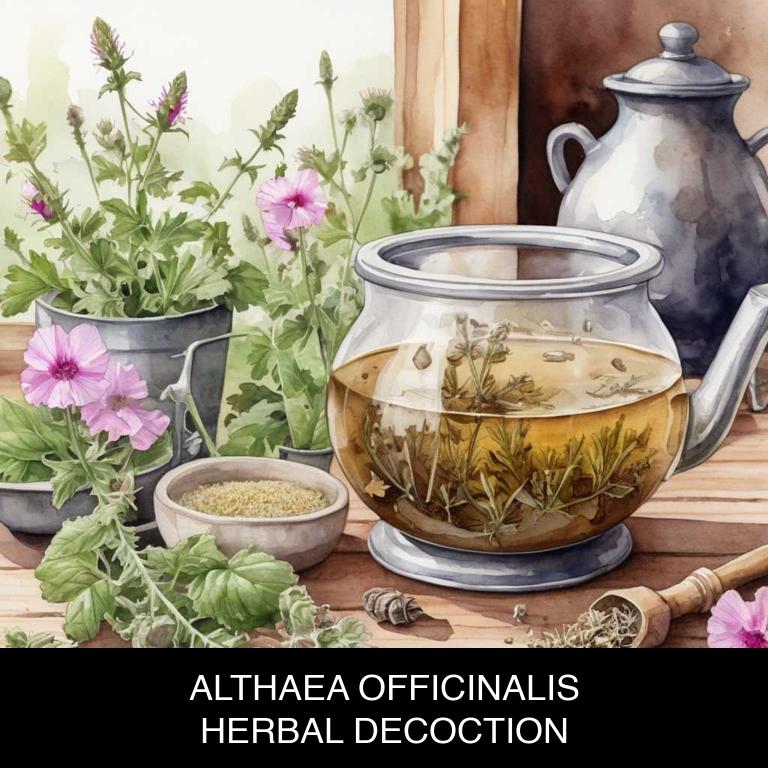
Medicinal Constituents
The list below shows the primary medicinal constituents in Althaea officinalis decoctions that help with dry throat.
- Mucilages: Mucilages help to soothe and protect the mucous membranes of the throat, reducing inflammation and discomfort associated with dry throat.
- Iridoids: Iridoids have anti-inflammatory and antioxidant properties, which can help to calm the inflammation in the throat and promote healing, thereby alleviating dry throat symptoms.
- Flavonoids: Flavonoids, particularly quercetin, have a soothing effect on the mucous membranes, reducing inflammation and pain, and helping to combat dryness and irritation in the throat.
Parts Used
The list below shows the primary parts of marshmallow used to make decoctions for dry throat.
- Roots: They are used due to their high mucilage content, which helps to soothe and protect the mucous membranes in the throat.
- Leaves: They are used because they also contain mucilage, although in lesser amounts than the roots, which still provides relief for dry throat.
- Stems: They are used as a source of additional mucilage, which helps to alleviate dryness and irritation in the throat.
Quick Recipe
The following recipe gives a procedure to make a basic marshmallow for dry throat.
- Harvest 1-2 cups of the roots of the plant in late summer or early fall when the plant is in seed.
- Clean the roots thoroughly to remove dirt and debris with cold water.
- Chop the roots into small pieces to increase their surface area for infusion.
- Combine the chopped roots with 4 cups of cold water in a saucepan and bring to a boil.
- Simmer the mixture for 10-15 minutes and then strain it through a cheesecloth to remove the solids.
6. Calendula officinalis
Pot marigold decoctions helps with dry throat because of its potent anti-inflammatory properties, which soothe and calm irritated mucous membranes.
The decoction's flavonoids and saponins work together to reduce swelling and inflammation in the throat, providing fast relief from discomfort and scratchiness.
Additionally, the antibacterial and antiviral compounds found in pot marigold help combat underlying infections that may be contributing to dryness and irritation, making it a natural and effective remedy for dry throat symptoms.
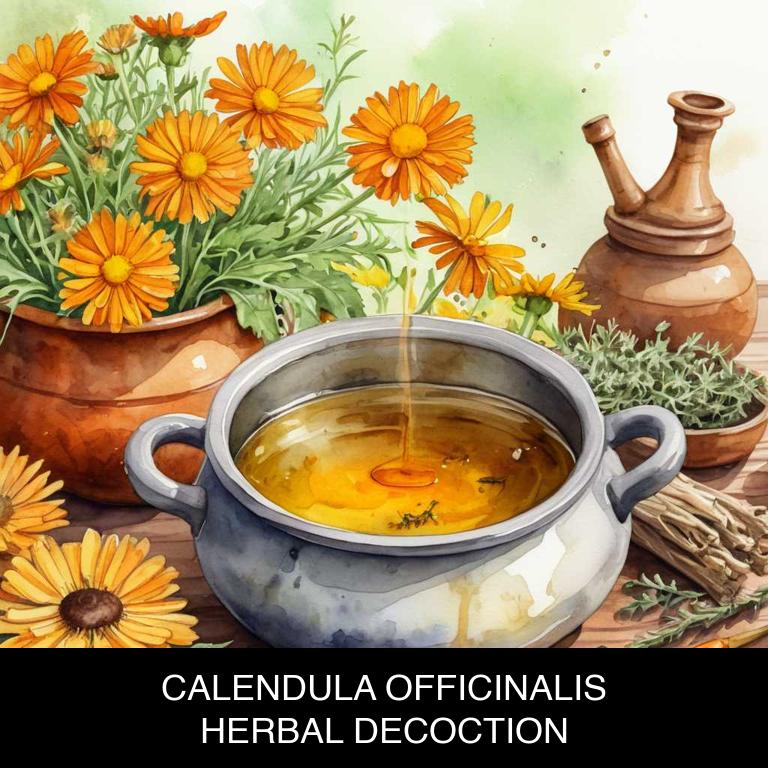
Medicinal Constituents
The list below shows the primary medicinal constituents in Calendula officinalis decoctions that help with dry throat.
- Phenolic acids: They help soothe and protect the mucous membranes in the throat, reducing inflammation and discomfort associated with dry throat.
- Flavonoids: They have anti-inflammatory and antioxidant properties, which help reduce swelling and repair damaged tissues in the throat, providing relief from dryness and discomfort.
- Triterpenoids: They possess anti-inflammatory and antimicrobial properties, which help reduce inflammation, prevent infection, and promote healing in the throat, thereby alleviating dry throat symptoms.
Parts Used
The list below shows the primary parts of pot marigold used to make decoctions for dry throat.
- Flowers: Used to make decoctions for dry throat due to their anti-inflammatory and soothing properties.
- Leaves: Used to make decoctions for dry throat due to their soothing and anti-inflammatory properties.
- Roots: Used to make decoctions for dry throat due to their ability to reduce inflammation and promote healing.
Quick Recipe
The following recipe gives a procedure to make a basic pot marigold for dry throat.
- Harvest 20-30 calendula officinalis flowers at full bloom and dry them thoroughly in a warm dark place for 2 weeks.
- Weigh out 2-3 grams of dried calendula officinalis flowers for a standard decoction dosage.
- Combine the weighed flowers with 250 milliliters of water in a saucepan and bring to a boil.
- Simmer the mixture for 5-10 minutes then reduce heat to a low simmer.
- Strain the decoction through a cheesecloth or fine-mesh sieve into a clean container discard solids.
7. Camellia sinensis
Tea decoctions helps with dry throat because they offer natural relief from inflammation and irritation.
The soothing properties of herbs like slippery elm, licorice root, and marshmallow root help to calm and protect the mucous membranes in the throat, reducing discomfort and scratchiness.
Additionally, many herbal teas contain antioxidants that combat free radicals and promote healing, further alleviating dryness and promoting overall throat health.
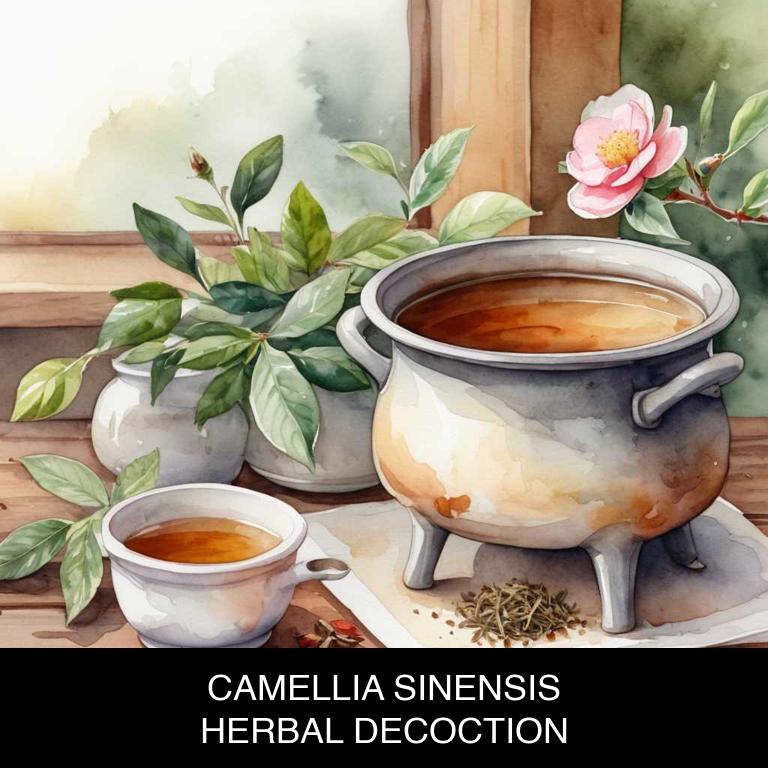
Medicinal Constituents
The list below shows the primary medicinal constituents in Camellia sinensis decoctions that help with dry throat.
- Catechins: These polyphenolic compounds help with dry throat by reducing inflammation and acting as a mild astringent, which helps to soothe and calm irritated tissues.
- Theaflavins: These flavonoid compounds have anti-inflammatory properties, which help to reduce swelling and redness in the throat, providing relief from dryness and discomfort.
- Quercetin: This flavonoid compound is a natural anti-inflammatory agent that helps to reduce swelling and pain in the throat, while also soothing and protecting the mucous membranes from further irritation.
Parts Used
The list below shows the primary parts of tea used to make decoctions for dry throat.
- Leaves: Leaves are the most commonly used part for decoctions, as they contain high amounts of antioxidants and flavonoids that help soothe and calm the throat.
- Stems: Stems are another frequently used part, as they have similar properties to leaves and can be used to make teas that help reduce inflammation and irritation in the throat.
- Buds: Buds are often used for decoctions due to their high concentration of flavonoids and other compounds that have anti-inflammatory and antiseptic properties, which can help alleviate dry throat and promote healing.
Quick Recipe
The following recipe gives a procedure to make a basic tea for dry throat.
- Harvest 20-30 grams of camellia sinensis leaves and flowers to use for decoction.
- Rinse the harvested camellia sinensis leaves and flowers with cool running water to remove dirt.
- Chop the camellia sinensis leaves and flowers into smaller pieces to increase surface area.
- Combine the chopped camellia sinensis with 2 liters of water in a saucepan and bring to a boil.
- Simmer the mixture for 5-10 minutes then strain it through a cheesecloth to remove solids.
8. Echinacea purpurea
Purple coneflower decoctions helps with dry throat because of its natural anti-inflammatory properties, which soothe and calm irritated mucous membranes.
The decoction's active compounds, such as echinacin and sesquiterpenes, work to reduce swelling and relieve discomfort caused by dryness. Additionally, purple coneflower's expectorant properties help to loosen and clear mucus, allowing for easier swallowing and reducing the sensation of a scratchy throat.
This natural remedy provides effective relief from dry throat symptoms without harsh chemicals or artificial additives.
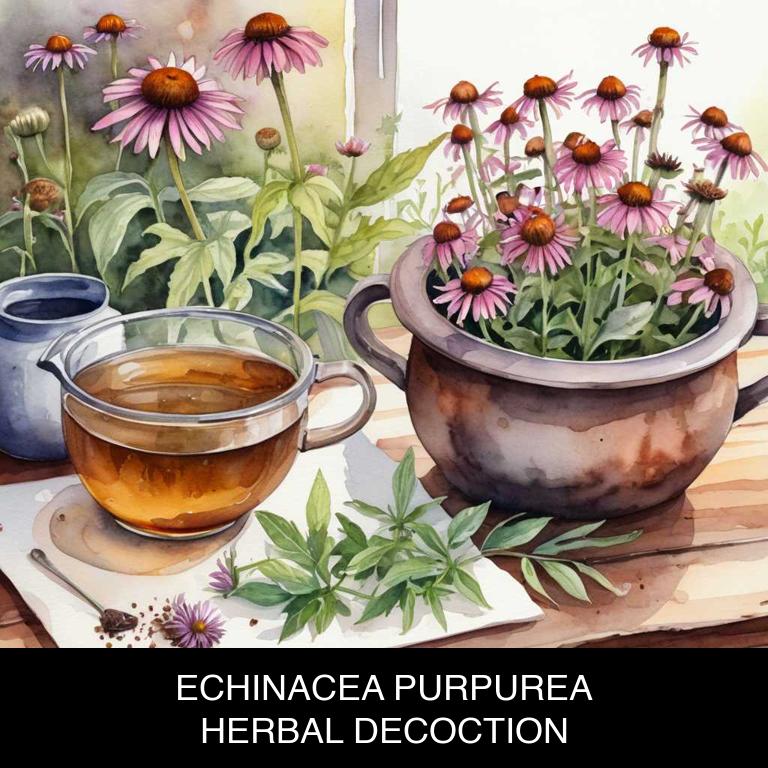
Medicinal Constituents
The list below shows the primary medicinal constituents in Echinacea purpurea decoctions that help with dry throat.
- Iridoid glycosides: These compounds have anti-inflammatory properties, which help to soothe and calm the throat, reducing irritation and dryness.
- Chlorogenic acid: As a phenolic compound, chlorogenic acid has antioxidant and anti-inflammatory effects, which help to protect the throat from damage and reduce inflammation, alleviating dry throat symptoms.
- Flavonoids: These compounds have potent anti-inflammatory and antioxidant properties, which help to reduce inflammation and protect the throat from damage, alleviating dryness and discomfort.
Parts Used
The list below shows the primary parts of purple coneflower used to make decoctions for dry throat.
- Roots: Echinacea roots are commonly used due to their rich content of alkaloids and glycosides, which are believed to have anti-inflammatory and immune-boosting properties that help alleviate a sore throat.
- Leaves: Echinacea leaves are used because they contain a higher concentration of flavonoids, which have antioxidant and anti-inflammatory effects that can help soothe and protect the mucous membranes in the throat.
- Flowers: Echinacea flowers are used due to their high content of alkylamides, which are believed to have anti-inflammatory and immunomodulatory effects that can help reduce swelling and pain in the throat.
Quick Recipe
The following recipe gives a procedure to make a basic purple coneflower for dry throat.
- Harvest fresh echinacea purpurea flowers and roots in late summer or early fall when they are fully ripe.
- Dry the harvested echinacea purpurea flowers and roots in a cool dark place for 1 to 2 weeks.
- Combine 2 tablespoons of dried echinacea purpurea flowers and 1 tablespoon of dried echinacea purpurea root in a saucepan.
- Pour 1 quart of boiling water over the dried echinacea purpurea mixture and let it steep for 5 to 10 minutes.
- Strain the decoction and discard the solids then drink the liquid immediately while it is still warm.
9. Gaultheria procumbens
Wintergreen decoctions helps with dry throat because of its unique combination of properties.
The decoction contains methyl salicylate, a natural expectorant that loosens mucus and reduces inflammation in the throat. Additionally, wintergreen's antibacterial and anti-inflammatory compounds help to soothe and calm irritated tissues, providing instant relief from scratchy and sore throats.
As the decoction is easily absorbed into the body, it quickly targets dryness and discomfort, leaving the throat feeling smooth and refreshed.
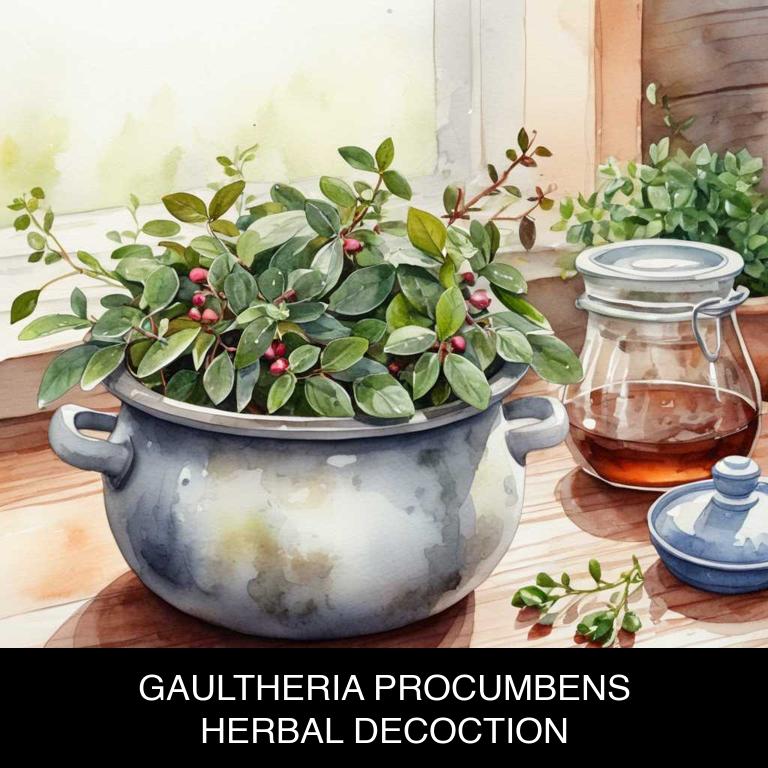
Medicinal Constituents
The list below shows the primary medicinal constituents in Gaultheria procumbens decoctions that help with dry throat.
- Gaultherin: Gaultherin, a phenolic compound, helps with dry throat by reducing inflammation and acting as an antimicrobial agent, thereby alleviating symptoms of dry throat and promoting healing.
- Methyl salicylate: Methyl salicylate, a terpene, helps with dry throat by reducing inflammation, relieving pain, and acting as a natural expectorant, making it easier to expel mucus and alleviate dryness.
- Tannins: Tannins, a type of polyphenol, help with dry throat by reducing inflammation, acting as an astringent, and forming a protective barrier on the mucous membranes, thereby soothing and protecting the throat from further irritation.
Parts Used
The list below shows the primary parts of wintergreen used to make decoctions for dry throat.
- Roots: They are rich in salicin, a compound that provides relief from inflammation and pain associated with a dry throat.
- Leaves: They contain a high concentration of glycosides, including salicin, which helps to soothe and calm a dry, irritated throat.
- Stems: The stems of Gaultheria procumbens contain a mixture of salicin and other compounds that help to reduce inflammation and provide relief from a sore throat.
Quick Recipe
The following recipe gives a procedure to make a basic wintergreen for dry throat.
- Harvest gaultheria procumbens leaves and stems in the summer months when they are at their peak potency.
- Dry the harvested gaultheria procumbens material in a warm dry place for at least 2 days.
- Weigh out 1-2 teaspoons of dried gaultheria procumbens for every 8 ounces of water for a decoction.
- Combine the weighed gaultheria procumbens with water in a saucepan and bring to a boil.
- Simmer the decoction for 10-15 minutes then strain and discard the solids to yield a liquid extract.
10. Hedera helix
Ivy decoctions helps with dry throat because they contain natural anti-inflammatory compounds that soothe and calm the mucous membranes, reducing inflammation and irritation.
The decoction's antioxidants also help to neutralize free radicals, which can exacerbate dryness and discomfort. Additionally, ivy decoctions have a gentle, non-irritating texture that coats and protects the throat, providing long-lasting relief from dryness and scratchiness.
This natural remedy is particularly effective for people who experience recurring dry throats due to environmental factors or allergies.
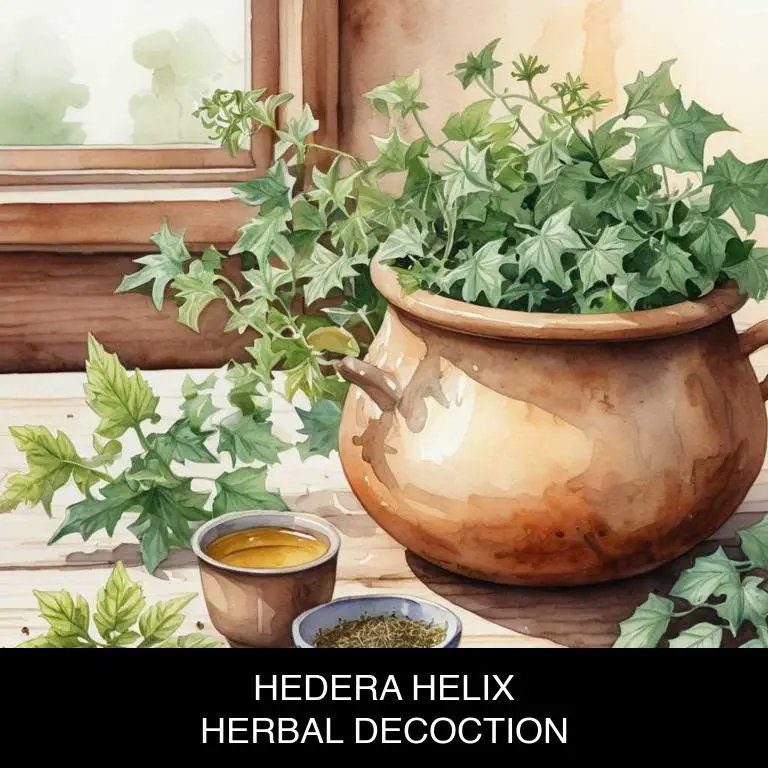
Medicinal Constituents
The list below shows the primary medicinal constituents in Hedera helix decoctions that help with dry throat.
- Aromadendrene: Aromadendrene, a sesquiterpene, has anti-inflammatory properties that help reduce swelling in the throat, thereby alleviating dry throat discomfort.
- Vasconine: Vasconine, a triterpene saponin, acts as an expectorant, loosening and thinning mucus, which helps to clear out the throat and provide relief from dryness.
- Hedrin: Hedrin, a lignan, exhibits antioxidant properties that help protect the throat from oxidative stress and inflammation caused by dryness, promoting a healthy and comfortable environment.
Parts Used
The list below shows the primary parts of ivy used to make decoctions for dry throat.
- Leaves: Leaves of Hedera helix are commonly used due to their high mucilage content, which helps to soothe and protect the throat.
- Roots: Roots are used for their expectorant properties, helping to loosen and clear mucus from the throat, providing relief from dryness.
- Stems: Stems of Hedera helix are used due to their rich content of mucilage, which helps to lubricate and calm the throat, providing quick relief from dryness.
Quick Recipe
The following recipe gives a procedure to make a basic ivy for dry throat.
- Gather 30 grams of dried hedera helix leaves and store them in an airtight container.
- Measure out 250 milliliters of water and pour it over the dried leaves.
- Bring the water to a boil then reduce the heat to a simmer for 10 minutes.
- Strain the decoction through a cheesecloth or a fine mesh into a bowl.
- Discard the solids and let the decoction cool to room temperature before serving.
What is the best combination of herbal decoctions to use for dry throat?
The best combination of herbal decoctions that help with dry throat is a blend of slippery elm, marshmallow root, and licorice root.
Slippery elm soothes and protects the mucous membranes, while marshmallow root provides a coating to calm inflammation. Licorice root adds anti-inflammatory properties to reduce swelling and promote healing.
By combining these herbs, you can create a powerful decoction that helps to heal and soothe a dry throat, promoting a healthy and comfortable respiratory system.
What ailments similar to dry throat are treated with herbal decoctions?
Ailments similar to dry throat that are treated with herbal decoctions are respiratory issues such as bronchitis, asthma, and coughs.
Herbal decoctions made from plants like slippery elm, marshmallow root, and licorice root help soothe and moisturize the mucous membranes, reducing inflammation and discomfort.
These decoctions can also be used to treat digestive issues like irritable bowel syndrome (IBS) and acid reflux by calming the stomach lining and promoting gut health.